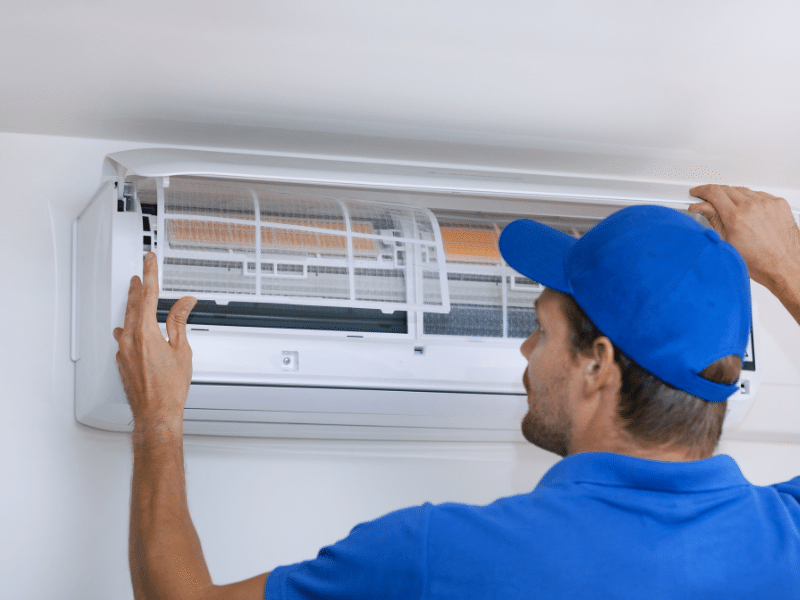By practicing proper HVAC maintenance, you’ll be able to save money, breathe safer and healthier air, and be comfortable indoors. This allows us to catch any common HVAC problems before they develop and take care of them before they progress into something more serious. In addition, monthly HVAC maintenance can cut down the cost of your monthly energy bill by as much as 30 percent. Maintenance allows your system to run at maximum efficiency.
Dirty filters and coils
A dirty air filter is one of the most common HVAC problems which affects the performance of household HVAC systems. Fortunately, a dirty filter is one of the easiest problems to fix. Your air filter should be changed on a regular basis. In some cases, depending on your local air quality and whether you have pets, you may need to change a dirty filter every month.
What kind of air filter should you use? There are many different grades, so look for the MERV rating on the filter. The higher the number, the better it will filter the air.
The evaporator coil of your HVAC system’s heat pump or air conditioner is an essential component. If your units have a dirty coil, their efficiency will be decreased by a significant amount.
A dirty evaporator coil on an exterior unit like a heat pump can simply be hosed off, while a trained service technician should clean coils on indoor units like air conditioners.
Electric issues
Electrical problems occur due to faulty wiring, loose connections, or damaged electrical components. They can cause the HVAC system to malfunction or even pose a safety hazard.
Regular HVAC maintenance includes inspecting and testing the electrical components to detect any issues and ensure they are functioning correctly. Using Computer-Aided Facility Management Software helps you track when OEM’s recommended inspections are due and ensure they are done on time. By staying on top of maintenance, you ensure the safety and efficiency of your HVAC system.
Frequent repairs
You’ll need several repairs if you don’t put the proper resources into the HVAC maintenance. Things break down over time, which can cause rust, cracks, and leaks. This will begin by increasing your energy usage, but it’ll eventually get to the point of breaking completely. If that happens, all you can do is hope that you don’t need a full replacement.
Regular maintenance by an HVAC service also means extending the lifespan of your HVAC system, so you’ll have significantly more time before having to worry about a replacement.
Unusually high energy bills
According to the Office of Energy Efficiency, you can improve your energy use by 50% for electricity and 10% for gas just by upgrading your HVAC system. This is because your HVAC significantly contributes to the cost of your utility bills. If you fail to replace your system in time or don’t practice preventative maintenance, then the system won’t run efficiently. This doesn’t always mean a full replacement; something as simple as cleaning your air conditioning filter can reduce your energy costs.
Excessively loud noise from your unit
All HVAC units make noise. But if it’s too much, you may have a soon-to-be costly repair issue on your hands.
Different noises can suggest different issues as to why your air conditioner is failing.
- Squealing or screeching: Defective belt
- Rattling or jittering: Broken fan, motor, or compressor
- Buzzing: Refrigerant leak, loose or unbalanced outdoor fan
- Clicking: Malfunctioning thermostat
- Bubbling: Broken drainage line
- Hissing: Air duct leak
- Banging: Loose parts within the compressor
Other common HVAC problems can be caused by improper airflow or dirty burners. Any unusual sounds coming from your HVAC shouldn’t be disregarded since it may be a sign of a failing system, which may require a full HVAC unit replacement, costing you thousands of dollars.
Leaking refrigerant (Freon) or water leaks
If drain lines get clogged or damaged, furnaces can start leaking water which starts to form puddles around the bottom of the unit. Pouring some bleach through drain lines occasionally is recommended to keep them clean.
Some of the other causes for a leaking drain line include:
- Collector Box
- Heat Exchanger
- Evaporator Drain Pan
Don’t overlook HVAC issues. Early detection saves costs and ensures comfort. Reach out to our experts for prompt and reliable HVAC maintenance today.
